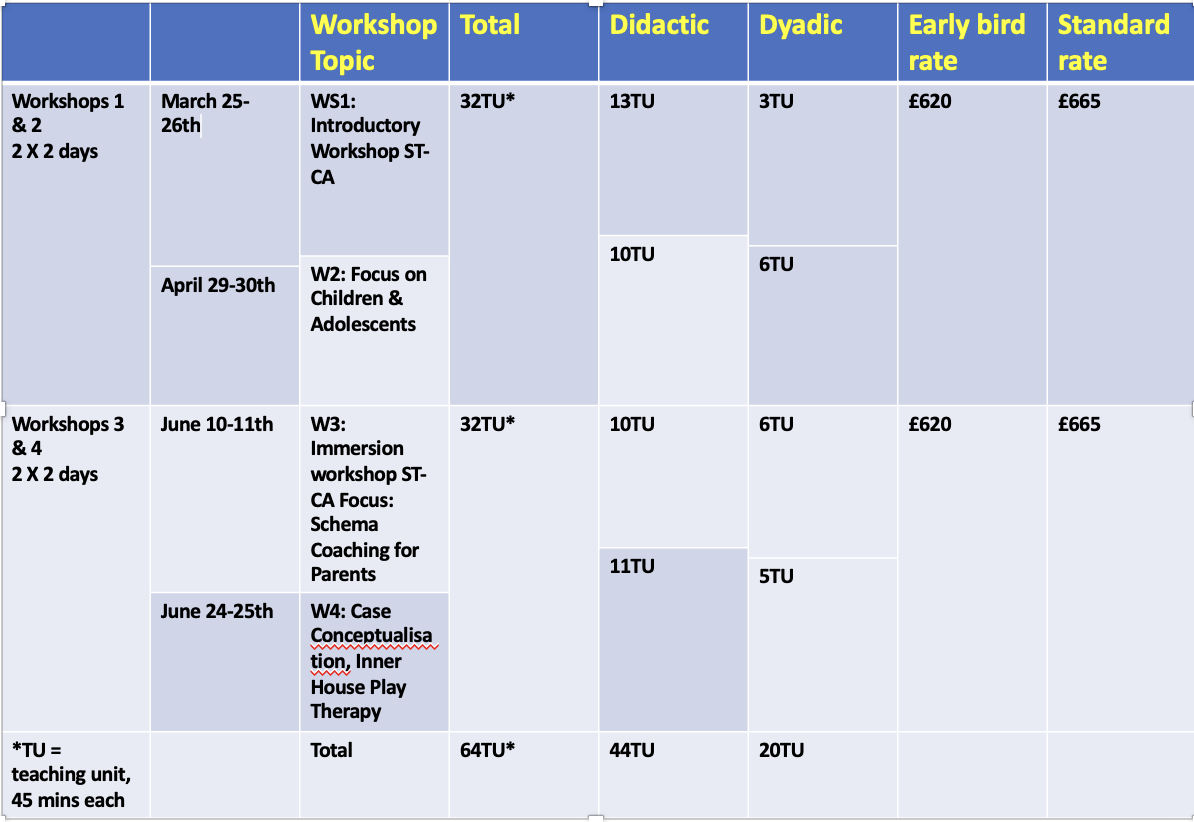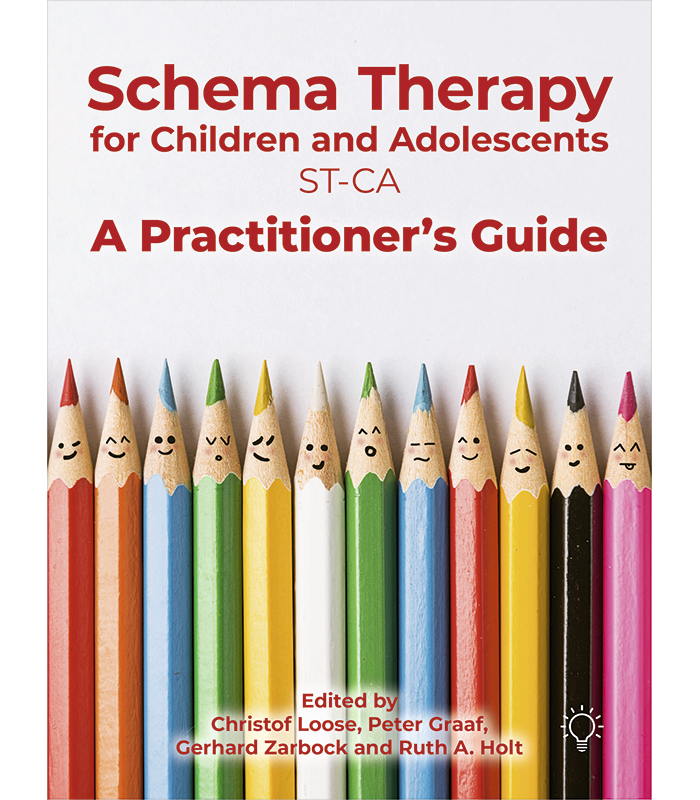Schema Therapy for Children & Adolescents l Online Training l March-June 2024 I Schema Therapy Scotland
Schema Therapy for Children and Adolescents (ST-CA)
Trainer – Dr. Christof Loose, Clinical Psychologist and author, based at the Centre for Schema Therapy Dusseldorf & Private Practice for Psychotherapy and author of ‘Schema Therapy for Children and Adolescents’ (Pavilion). He is a highly experienced trainer in Schema Therapy for Children, Adolescents (and Parental Education/Coaching) and has provided training internationally.
Venue – ONLINE (Interactive Zoom Training)
Cost:
- W1-4 (Full Training) = £1330
- W1 &2 = £665
- W3 &4 = £665
Dates – (4 X 2-day workshops)
- Workshop 1: March 25th, 26th 2024
- Workshop 2: April 29th, 30th 2024
- Workshop 3: June 10th, 11th, 2024
- Workshop 4: June 24, 25th, 2024
CPD – 56 hours of active CPD
Who is this workshop for? This workshop is suitable for a range of professionals who practice psychotherapy, including psychiatrists, psychologists, social workers, and other professions with psychotherapy training.
Workshop Content:
In total, there are 4 workshop units (WS 1-4) within the “Children’s Curriculum”, first the schema therapeutic conceptual model (schemas, modes, coping strategies), the underlying theory (central importance core needs in the context of developmental tasks), possible diagnostic methods (eg, projective methods) and development of a schema-based therapeutic mindset (eg, concept of “limited reparenting” and “empathic confrontation”) that will enhance working with the specific temperament and personality factors of childhood and adolescence. Practitioners are taught to interweave schema-based therapeutic strategies that have proven successful with evidence-based strategies from cognitive behavioural therapy for childhood and adolescence. Another focus is laid on the teaching of advanced and deepening work with parents in the form of “Schema Coaching for Parents”. This includes schema or mode specific transactional processes between child and parent, and shed a light on the mutual reinforcement processes of child’s und parent’s maladaptive schemas and modes.
Beside the features of schema theory, the workshops offer many practical demonstrations through picture and video material and life demonstrations, and small exercises allow participants to transfer the content into their own practice.
Children’s Curriculum in ST-CA (64 TU)
Introductory Workshop 1 & 2 with Focus on Children & Adolescents” (2+2 days)
The introductory workshop (WS 1) illustrates the formation and perpetuating model of maladaptive schemas against the background of age-specific developmental tasks, risk and protective temperamental factors. Relative to the children’s age, early maladaptive schemas described by Young are outlined with their typical child and adolescent appearance and coping strategies. Other topics include the multimodal diagnostic techniques (use of exploration, survey, imagery, case conceptualization) and explain the significance of the therapeutic relationship, psychoeducation and empathic confrontation.
As an overview, therapeutic strategies are demonstrated: Working with drawings and pictures, finger and hand puppets, working with stories, metaphors, chair work, imagery, and the use of flash cards.
Video examples or life demonstrations and role-play in groups of two or three participants ensure the consolidation and deepening of following exercises:
- Imagery Parent Interview
- Creating a Mode Sketch
- Conducting a Mode Interview
- Working with (stem) stories
- Working with finger and hand puppets
- Working with chair dialogues (3-Chair dialogue: “Mode driving license”)
- Working with mode cards (Mode walk: Feel, Talk, & Walk)
- Working with chair dialogues (2-Chair dialogue: Focus Critic/Punisher)
- Imagery (Fantasy Trip to the Clever & Wise Mode)
Workshop 3 & 4 in ST-CA with Focus on Parents & Schema-Coaching, Case Conceptualization, and Play Therapy (2+2 days)
This workshop builds upon the content of the WS 1 & 2. Participation in WS 1 & W2 are a prerequisite for this immersion workshop. After a brief connection with the content of WS 1 & 2, the focus will be on the features of working with parents (“Schema Coaching for Parents”), including psychoeducation, work with chairs, mode flash cards, internal dialogue and imagery.
Another goal of this workshop is to apply the schematic therapeutic approaches to participants’ own cases. After the case presentation in the plenary, participants work in small groups, using the schema therapeutic case conceptualisation and treatment plan for this patient and their family. Based on already implemented schematic therapeutic treatment, techniques progress and problems in the interventions that have been applied are discussed. In the last unit participants will learn, how to work with the “Inner House”, and to follow the schema therapeutic approaches in the context of Play Therapy (preschool and primary school age). In particular, the content and methods are:
- Therapeutic relationship with parents: “Limited Grandparenting”
- Education of the schema and mode concept
- Collusion of schemas and modes among the therapist and the patient (child/parents)
- Schema Genogram
- Working with chair dialogues (2-Chair dialogues: Focus Detached Protector)
- Imagery (Visualizing Caring Parental Modes)
- Imagery Rescripting
- Illustration of the basic approach to case conceptualization
- Conceptualization and treatment planning for their own cases
- Working on the “Inner House”
- Mode-oriented play therapy
- Special problems in the therapy
Video and illustrations, live demonstrations, and/or role-play in groups of two or three participants ensure the consolidation and deepening of what has been learnt.
Additional information about ST-CA on www.schematherapy-for-children.de where you can find the “Story of Felix and his Modes”.

RESOURCES:
SCHEMATHERAPY FOR CHILDREN AND ADOLESCENTS:
1/ See Christof’s Youtube Channel:
- https://youtu.be/42R9qKwI_Lc (Trailer ST-CA)
- https://youtu.be/sDF1NkTxBDA (What to do when Tom’s feeling blue)
2/ Loose, C. Graaf, P. Zarbock, G., & Holt, R.A.(Editors) (2020). Schema Therapy with Children and Adolescents: A Practitioner’s Guide. UK: Pavilion Publishing and Media Ltd.
The first book to adapt Schema Therapy for children and adolescents (ST-CA) in English
Presents the ST-CA model and provides a clear, practical guide to clinical implementation
Approaches schemas and modes in developmental stages
Provides specific guidance and creative ideas for engaging young people in each age group across the 5 key stages from infancy to age 23
You are invited to access these 3 enriching assessments that focus on the first three chapters of the ST-CA book: free of charge. You will receive a Certificate on Completion!
https://www.flexiquiz.com/SC/
https://www.flexiquiz.com/SC/
https://www.flexiquiz.com/SC/
Bookings can only be confirmed upon full payment
To register and pay electronically please fill out the online form by scrolling to the bottom of this page AND click on the registration button below.
If you prefer us to invoice your employer, please indicate this on the form, giving all details (including purchase order number where applicable).
Register for Workshops 1 & 2:
Register for Workshops 3 & 4:
Register for all Workshops 1, 2, 3 & 4
For enquiries please contact us at info@schematherapyscotland.com
*Please note that this workshop will proceed with a minimum of 10 participants. In the case of insufficient registrations, participants will be given a minimum of 3 weeks’ notice of cancellation or postponement.


